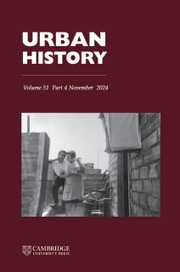No CrossRef data available.
Broad views of the urban past in Europe and its extensions
Published online by Cambridge University Press: 20 June 2007
Extract
Readers of English can currently refer to only two works that offer synthetic overviews of the history of European cities from the period of classical antiquity into the twentieth century. We have long had the powerfully argued and highly readable book by the architectural critic, Louis Mumford, The City in History: Its Origins, Its Transformation, and Its Prospects (1961). Beginning with the earliest settlements in the Near East and continuing through the rise of the suburbs in the United States, Mumford's volume tells a dramatic story in which urbanity at its best (as exemplified by such communities as Athens and Amsterdam) gave way to a succession of assaults, whether in the form of Baroque planning, rampant industrialization, oversized ‘megalopolises’ or automobiles. Continuing in the vein of many earlier critics, Mumford saw the modern big city as a depressing departure from earlier norms of urban beauty and human solidarity, and his view of the future was bleak indeed. Nearly four decades later, Sir Peter Hall offered a similarly large-scale but otherwise very different view of the broad sweep of the urban past, in his Cities in Civilization: Culture, Innovation, and Urban Order (1998). He constructed his book not as a narrative but instead as clusters of case studies, in which sixteen cities appear as scenes and agents of various types of exemplary achievement. Focusing on Europe, but not restricting himself to it, Hall presented not only Athens, Florence, Paris, Vienna, London, Manchester and Berlin but also New York, San Francisco and Tokyo as ‘places that [have] ignited the sacred flame of intelligence and human imagination’ (p. 7). It is primarily for this reason that, in Hall's view, the history of great metropolises is inseparable from the history of civilization itself.
- Type
- Review Essay
- Information
- Copyright
- © 2007 Cambridge University Press




